|
What Do All Those Words Mean?
GLOBAL WARMING
Global warming, sometimes known as 'global heating' is now of great concern to everyone on our planet. Basically, our earth is getting hotter because of the greenhouse effect. It is predicted that temperatures will rise by 6.4 C by 2100! Also predicted is that sea levels will rise up to 88cm by 2100 (a disaster for low countries like Holland, Pakistan and islands). Our oceans will become more acidic so sea-life will not be able to survive.
We burn fossil fuels such as coal, oil and gas to produce electricty, plastic and fuels. Burning these fossil fuels produces CO2.
We farm cows, sheep and pigs to eat. These animals produce (ok...'fart') a gas called methane.
These gases stop heat leaving our atmosphere. So, the more gas we produce, the hotter our planet gets.
-In the last 100 years, the 10 hottest have been in the last 14.
-40% of the arctic ice-cap has melted in the past 40 years.
-Population growth is putting pressure on Earth's natural resources and adding more greenhouse gases to the atmosphere - 30% of CO2 comes from forest burning (to make room for grazing land for cattle so that we can eat meat). More people means more cars, planes, electricity and factories.
- Population is out of control
1945 = 2.3 billion
2005 = 6.4 billion
2050 (predicted) = 9.1 billion
The more greenhouse gases that we put in our atmosphere, the faster global heating will take place. Our planet will overheat. Crops will die, animals will no longer be able to survive and the human population will also face extinction.
Click To See Video!
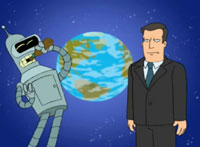 Global warming causes changed weather patterns (some areas are getting floods whilst others are in drought) and many of our plants and animals are not coping with the changes. We are losing coral reefs because the water is too warm for it. Our polar bears are losing the firm ice packs they need to feed and breed in the Arctic areas of Canada, Alaska, Russia, Norway and Greenland. Our scientists and environmentalists have been telling us for years that us humans are causing the earth to get hotter, but politicians have refused to believe them. Now everyone is working hard to find ways to stop...or slow, global heating. The only way is to stop producing so much greenhouse gases and that means change to Green energy, reduce our power consumption and stop cutting down our precious forests.
Global warming causes changed weather patterns (some areas are getting floods whilst others are in drought) and many of our plants and animals are not coping with the changes. We are losing coral reefs because the water is too warm for it. Our polar bears are losing the firm ice packs they need to feed and breed in the Arctic areas of Canada, Alaska, Russia, Norway and Greenland. Our scientists and environmentalists have been telling us for years that us humans are causing the earth to get hotter, but politicians have refused to believe them. Now everyone is working hard to find ways to stop...or slow, global heating. The only way is to stop producing so much greenhouse gases and that means change to Green energy, reduce our power consumption and stop cutting down our precious forests.
GREENHOUSE EFFECT
Global Warming balanced
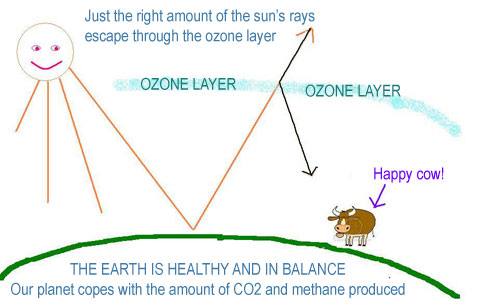 Without the Greenhouse Effect we'd all freeze to death. But the greenhouse effect has gone out of balance and is now making us too hot. When people talk about the 'greenhouse effect' they usually really mean 'the enhanced greenhouse effect'. This better describes how the effect is out of control.
Without the Greenhouse Effect we'd all freeze to death. But the greenhouse effect has gone out of balance and is now making us too hot. When people talk about the 'greenhouse effect' they usually really mean 'the enhanced greenhouse effect'. This better describes how the effect is out of control.
Sunlight shines from the Sun, through our atmosphere and warms the Earth. The Earth bounces the extra sun's rays (heat energy) back up into the atmosphere where some of it is blocked by greenhouse gases such as carbon dioxide, methane and nitrous oxide. If there is too much greenhouse gas, too much of the sun's energy is trapped in the atmosphere which makes the Earth hotter and hotter.
Global Warming Unbalanced
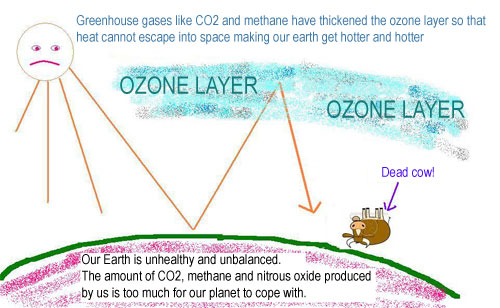 It is called the 'enhanced greenhouse effect' because it is like a greenhouse, where you grow tomatoes. The sun shines through the glass, but the heat is trapped in the greenhouse by the glass. This means that the plants can grow quicker as it's always nice and warm in the greenhouse.
It is called the 'enhanced greenhouse effect' because it is like a greenhouse, where you grow tomatoes. The sun shines through the glass, but the heat is trapped in the greenhouse by the glass. This means that the plants can grow quicker as it's always nice and warm in the greenhouse.
But...we're not tomatoes, so we really have to find a way of reversing all the greenhouse gases we have sent into our atmosphere by burning fossil fuels like coal, gas and oil.
GREENHOUSE GASES
These are gases which trap heat from the sun, stopping it from escaping out into space. If we didn't have these gases trapping the heat, Earth would be at least 15 C colder - which means that many countries would be permanantly frozen.
The main greenhouse gases are (1) carbon dioxide, (2) nitrous oxide, and (3) methane.
Carbon Dioxide, or 'CO2', is made up of oxygen and carbon. It is usually a gas, but if it is frozen it's 'dry ice' (the stuff they put in smoke machines at discos). It's produced by living creatures when they breathe out and also when we burn fossil fuels. Luckily, plants and trees are really good at sucking in this carbon dioxide and turning it into oxygen through a process called 'photosynthesis' - which we then breathe and turn back into CO2!
Nitrous Oxide, or 'N2O', is made-up of nitrogen and oxygen. It is a gas used by dentists and doctors to anaestethise you; it's often called 'laughing gas' because it sometimes made people euphoric (feel very happy)...till they woke up and found all their teeth had been removed! It is also used in cans of whipped cream and spray oil. It's produced by bacteria in our soil and oceans which feed on decaying plants and animals.
Click To See Video!
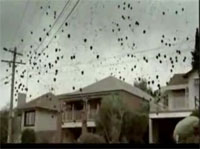
Click To See Video!
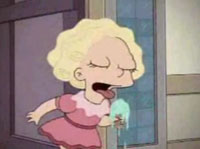 Methane, or 'CH4', is made up of hydrogen and carbon. It is the most powerful of all the greenhouse gases. For each kg of methane, you would need 23kg of CO2 to warm the atmosphere by the same amount. It is produced by microbes (tiny little organisms) that live in everything soil and the intestines of animals...and us! It is very important in the decay of plants and animals. We mostly know methane as the gas passed out through the bottoms of various animals and old grandads. (See Alastair's story 'How Farting Cows Can Help Your Homework Blues!).
Methane, or 'CH4', is made up of hydrogen and carbon. It is the most powerful of all the greenhouse gases. For each kg of methane, you would need 23kg of CO2 to warm the atmosphere by the same amount. It is produced by microbes (tiny little organisms) that live in everything soil and the intestines of animals...and us! It is very important in the decay of plants and animals. We mostly know methane as the gas passed out through the bottoms of various animals and old grandads. (See Alastair's story 'How Farting Cows Can Help Your Homework Blues!).
CLIMATE CHANGE
Because the Earth is getting hotter, our weather is changing.
Image: South Australia Water
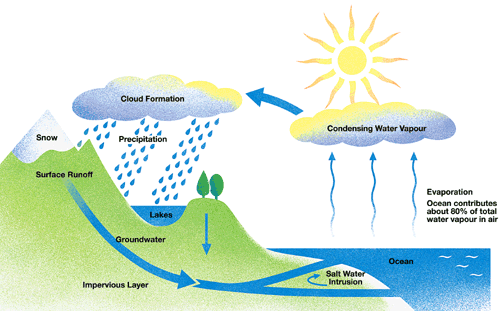 This is happening in many different ways. One example is the water cycle. It is changing to become 'enhanced' (having a bigger action).
(insert water cycle diagram here)
This is happening in many different ways. One example is the water cycle. It is changing to become 'enhanced' (having a bigger action).
(insert water cycle diagram here)
Because the Earth is heating, the speed which the water on the earth evaporates is speeded up. This means that the land is left dry and unable to grow plants.
We are starting to see a pattern of extreme and unstable weather. Hurricanes have become more frequent and stronger. Torrential rainstorms are occuring. Drought is affecting areas not used to a lack of rain. Europe is now experiencing very hot summers, so hot that many people are dying.
Click To See Video!
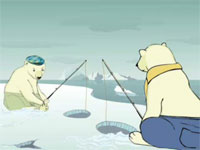
Click To See Video!
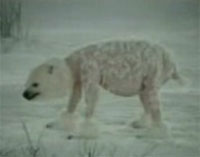 Around our planet are 'air streams' and 'water streams'. These are sort of highways of warmer or cooler air or water that travel faster or slower than the air or water around it. Just think of 'Finding Nemo' and the 'conveyor' that Nemo hitches a lift on with the turtles. Some of these are changing - for example, the Gulf Stream which takes warm water from the U.S across the Atlantic up to Scotland, is now cooling and slowing down. This will mean that all the vegetation and sea life which has depended upon the warmth, will now die.
Around our planet are 'air streams' and 'water streams'. These are sort of highways of warmer or cooler air or water that travel faster or slower than the air or water around it. Just think of 'Finding Nemo' and the 'conveyor' that Nemo hitches a lift on with the turtles. Some of these are changing - for example, the Gulf Stream which takes warm water from the U.S across the Atlantic up to Scotland, is now cooling and slowing down. This will mean that all the vegetation and sea life which has depended upon the warmth, will now die.
FOSSIL FUELS
Fossil fuels are coal, oil and gas.
Click To See Video!
 Oil and gas are the decomposed (rotted) plants and animals which lived around 300 million years ago, in the Carboniferous Period. Mostly these were things called phytoplankton and zooplankton. Coal is decomposed plant materials. The decomposed animal and plant stuff was compressed over the thousands of years as more plants, animals, dirt and rocks fell on top of them. They got squeezed until they formed coal, oil or gas.
Oil and gas are the decomposed (rotted) plants and animals which lived around 300 million years ago, in the Carboniferous Period. Mostly these were things called phytoplankton and zooplankton. Coal is decomposed plant materials. The decomposed animal and plant stuff was compressed over the thousands of years as more plants, animals, dirt and rocks fell on top of them. They got squeezed until they formed coal, oil or gas.
The oil, coal and gas that they made is found deep underground or under the seabed.
It took thousands of years for nature to produce it but we are now using it so fast that it will soon run out - it is predicted we will run out of oil and gas by 2050 and coal not long after that.
We burn 2 billion tons of coal each year to produce electricity for the world.
Oil is used to produce fuel for cars, planes and trains. It makes plastic, polythene and polyester (which is what a lot of your clothes are made out of!). Gas is used for heating, cooking and industry.
Fossil fuels are 'non-renewable' - once they're gone, they're gone for good. Burning fossil fuels produces greenhouse gases and air pollution. Tankers carrying oil often are damaged, pouring thousands of litres of crude oil into the sea and onto beaches. This kills countless fish, birds, seals, otters and penguins. We need to find alternatives.
|





















